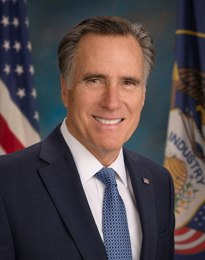Will Mitt Romney Be One and Done?
Only one Utah U.S. Senator has served just a single term during the direct election era

Romney intends to announce his 2024 plans in the next month or two. If he does run for a second term, he may face high profile GOPers like State House Speaker Brad Wilson (who has already formed an exploratory committee) and former four-term U.S. Representative Jason Chaffetz.
The uncertainty of Romney’s own candidacy as well as the concerted effort being made by the state party to put forth a bona fide challenger means there is a strong possibility Utah will have just its second one-and-done U.S. Senator during the direct election era.
No Utah U.S. Senator has died in office (in their first term or otherwise) and the only senator to resign did so two weeks prior to the end of his term (Wallace Bennett in late December 1974).
As a result, Utah is the only state yet to hold a special election since the adoption of direct elections for the U.S. Senate in 1913.
The single U.S. Senator who thus far has failed to serve more than six years in the chamber during this period was Democrat Abe Murdock.
Murdock got caught up in the 1946 GOP wave that netted the party a dozen seats across the country, losing his bid for a second term to attorney and former state district court judge Arthur Watkins by 2.5 points.
Each of the remaining directly elected U.S. Senators from Utah sought and won a second term:
- Republican Reed Smoot (who had served two terms elected by the state legislature) served five terms before losing his bid for a sixth in 1932
- Democrat William King served four terms until losing the 1940 Democratic primary 3:1 to the aforementioned four-term U.S. Representative Murdock
- Democrat Elbert Thomas served three terms prior to losing the 1950 general election
- Republican Arthur Watkins won two terms until losing the 1958 general election
- Republican Wallace Bennett was elected to four terms before retiring in 1974
- Democrat Frank Moss won three terms but lost his bid for a fourth in 1976
- Republican Jake Garn served three terms before retiring in 1992
- Republican Bob Bennett served three terms before losing his party’s convention vote in 2010
- Republican Orrin Hatch served a state record seven terms before retiring in 2018
- Republican Mike Lee is currently in his third term
The 2022 election cycle was the first cycle in the direct election era in which no U.S. Senators were defeated for their party’s nomination or at the general election and just the second time (along with 1914) in which none were defeated in the general. [Six senators retired – each had served at least two terms].
It seems highly unlikely the country will see a repeat of this unblemished mark by incumbents in 2024.
Follow Smart Politics on Twitter.

In addition to the aforementioned, Democrat William Henry King served 4 terms (elected in 1916, 1922, 1928, 1934) prior to losing the party primary election to Murdock. As well, Arthur Vivian Watkins, who had defeated Murdock, himself lost in 1958 as result of party split, namely over the McCarthyism issue.
Robert Foster Bennett in fact lost the qualifying/winnowing state party convention in 2010 (rather than a mere symbolic “endorsement”), where he placed third behind Tim Bridgewater and Mike Lee (qualifying for the primary election by petition was not available at the time). Starting with either 2016 or 2018 Senate election, candidates could make the primary ballot by gathering a requisite number of signatures, regardless of the result of the convention delegate votes.
Thanks for catching Sen. King – updated above as well as the characterization of the younger Bennett’s unseating.
UT has never had special senate race and 2017 was the 1st time since 1930 that they had a special house race.